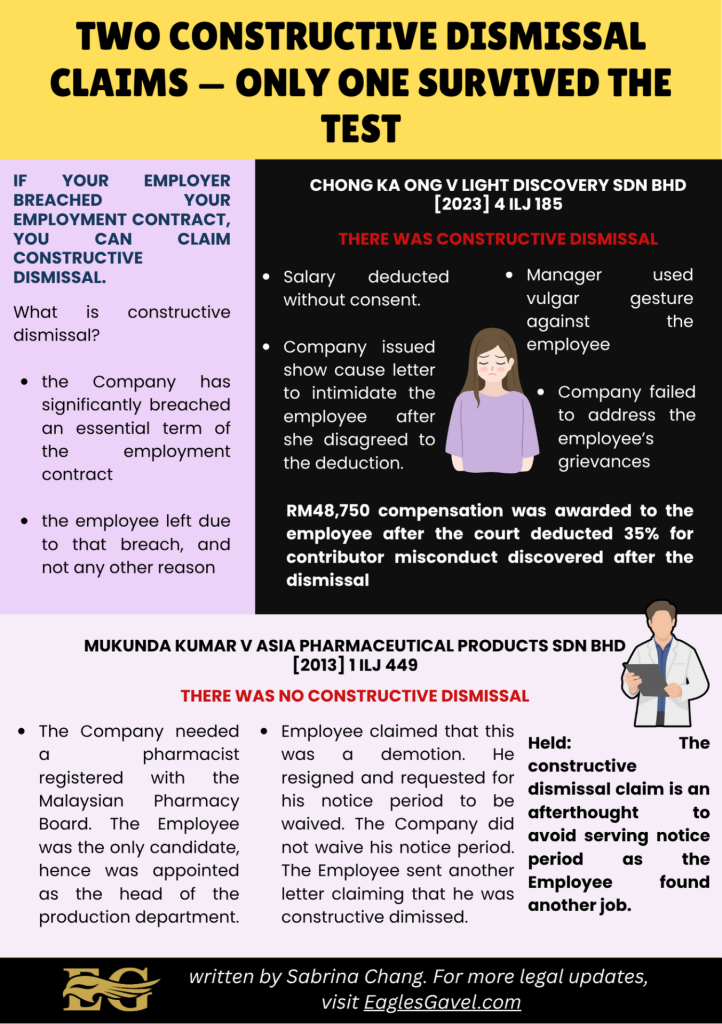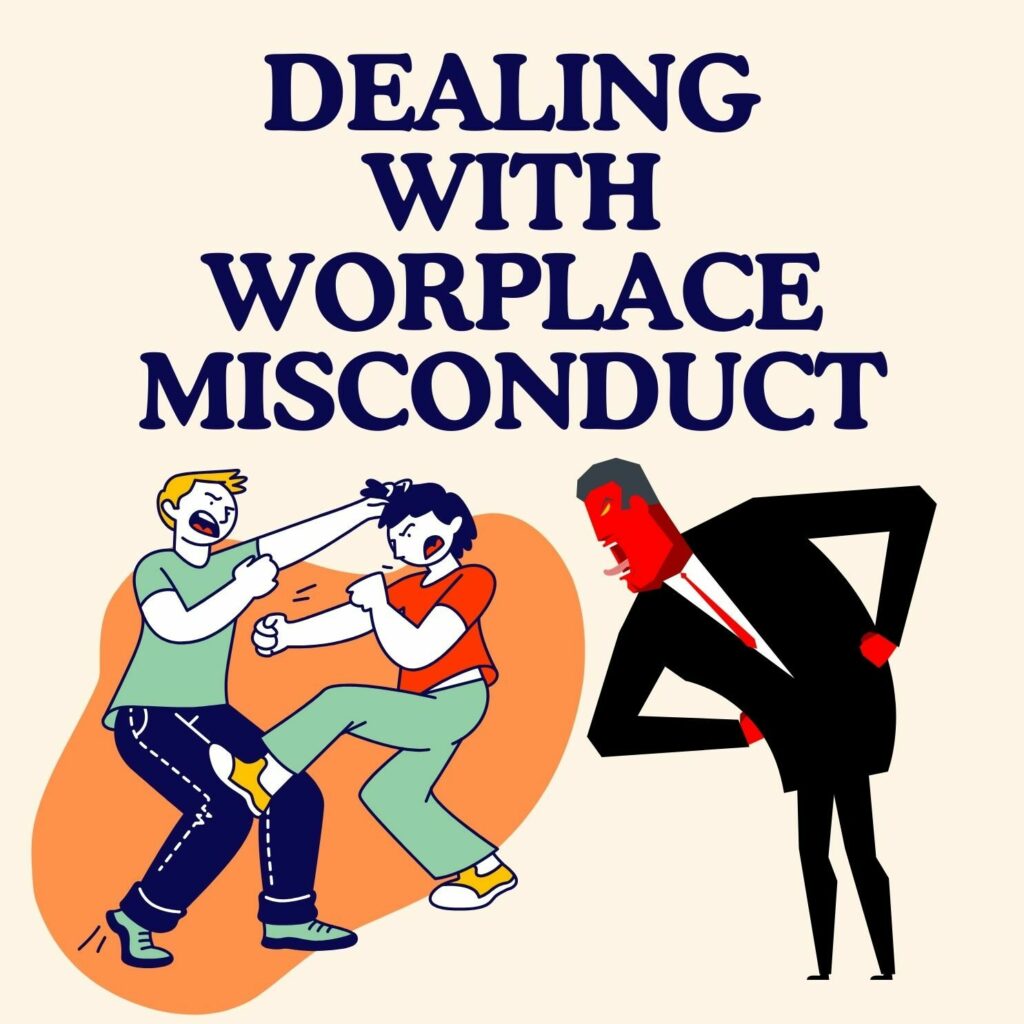
2 CONSTRUCTIVE DISMISSAL CLAIMS – ONLY 1 SURVIVED THE TEST
Justice Gopal Sri Ram JCA in delivering his judgment in the Court of Appeal explained the concept of “constructive dismissal”:
“An employer does not like a workman. He does not want to dismiss him and face the consequences. He wants to ease the workman out of his organisation. He wants to make the process as painless as possible for himself. He usually employs the subtlest of means. He may, under the guise of exercising the management power of transfer, demote the workman… Alternatively, he may take steps to reduce the workman in rank by giving him fewer or less prestigious responsibilities than previously held. Generally speaking, he will make life so unbearable for the workman so as to drive the latter out of employment. In the normal case, the workman being unable to tolerate the acts of oppression and victimisation will tender his resignation and leave the employer’s services. The question will then arise whether such departure is a voluntary resignation or a dismissal in truth and fact.”
Have you sometimes felt like your boss is trying to drive your colleague out of the company? Perhaps that colleague was handling the big files and suddenly he is only tasked with administrative tasks, he gets scolded and humiliated in every meeting and has been demoted. It is likely that your boss wants that colleague out of the company but do not want to fire him.
However, what the boss may not know is that even though he did not directly terminate your colleague’s employment, he may have “constructively dismissed” your colleague. Hence, your colleague can now claim constructive dismissal and leave immediately without serving notice period – he may also file an unfair dismissal claim against the company.
What is constructive dismissal?
- The employer has breach one or more essential terms of the employment contract; and
- The employee must leave due to the breach and not for any other reasons.
It is not in every case that you can claim constructive dismissal after getting scolded. Otherwise, the Court would have created a situation where employees can just walk off and claim constructive dismissal once they feel like the employer has been unreasonable.
The infographic above shows 2 cases where the employees claimed constructive dismissal – 1 was successful but had her compensation deducted by 35% because she was found to have committed a misconduct after the termination. Another one was unsuccessful as the Court found that he claimed constructive dismissal to avoid serving notice period.
Chong Ka Ong v Light Discovery Sdn Bhd [2023] 4 ILJ 185
- Due to Covid-19 pandemic, the Company asked the Claimant in April 2020 to accept a 20% pay cut for the month of April to September 2020, which the Claimant agreed.
- In October 2020, the Company continued with the pay cut. The Claimant objected and informed the Company that she is not agreeable to any further pay cut. Despite this, the Company proceeded with the pay cut in October and November 2020 without the Claimant’s consent.
- On 1.12.2020, the Company informed the Claimant that a new salary and commission scheme will be imposed, which will reduce the Claimant’s salary and result in the removal of her allowance. The Claimant objected.
- The Company without reasonable cause or excuse then issued the Claimant a show cause letter on 2.12.2023 for various alleged misconducts and poor perfromance. The Claimant responded immediately but the Company did not take any action nor inform her that the case has been closed.
- The Claimant’s manager also used vulgar gestures against the Claimant.
- The Company failed to reply to the Claimant’s grievances and had instead called for a meeting to berate her and used profanities against her.
- The Industrial Court held that the above series of conducts amounted to constructive dismissal:
- The show cause letter was issued to intimidate and victimise the Claimant and make her continued presence in the Company intolerable.
- The use of vulgarities by a superior officer towards a subordinate in a workplace especially where a show of power and authority is exhibited will seriously demean and humiliate the subordinate.
- Non-payment of salary or salary reduction without the employee’s consent is a fundamental breach and if not remedied upon demand by the employee will give rise to a constructive dismissal claim.
- It was discovered after the Claimant’s constructive dismissal that she had secretly recorded an entire official meeting which lasted for about 2 hours. The Industrial Court held that this amounted to a misconduct. As this was discovered after her termination, the Company could not have taken action against the Claimant but the Court must look for ways to hold the Claimant accountable. Therefore, the Court deducted 35% from the total amount ordered as compensation to the Claimant (RM26,250 was deducted from the Claimant’s compensation – the Claimant was only awarded RM48,750 after the deduction).
Mukunda Kumar s/o MS Nair v Asia Pharmaceutical Products Sdn Bhd [2013] 1 ILJ 449
- The Claimant was a pharmacist in the Company and worked as the quality assurance manager. The Company then appointed the Claimant as production pharmacist as the National Bureau of Pharmaceutical Control under the Health Ministry advised the Company that if it wanted to continue production, a registered pharmacist should head its production department. The Claimant was the only registered pharmacist, therefore he was appointed.
- However, the Claimant viewed this appointment as a demotion despite no salary, privileges or status change.
- The Claimant resigned and had to serve 3 months notice. The Claimant requested for his notice period to be waived. However, this was rejected by the Company.
- The Claimant then withdrew his resignation letter and gave a notice stating that he was constructively dismissed.
- The Industrial Court held that:
- The Claimant had already voluntarily resigned before he claimed constructive dismissal.
- There was no evidence that the Claimant was forced to resign. Instead, the Claimant was indespensable to the Company at that time as he was the only registered pharmacist.
- The Claimant’s constructive dismissal claim was an afterthought to avoid serving his requisite notice period as he had already found an alternative job.
Premised on the above cases, employers should bear in mind that just because they did not fire the employees directly does not mean that the Company has no liability. Employees on the other hand should understand that there is a certain threshold to be satisfied before a constructive dismissal claim can be established.
How can we help you?
For employers:
- Explore a proper and legal way with least risk exposure to terminate an employment relationship.
- Inform you of the estimated maximum financial exposure.
- Advise you at the conciliation meeting stage and assist to fill up the forms.
- Represent you in the Industrial Court.
For employees:
- Go through the documents and facts, then advise you on your next steps (it is better to get legal advice before claiming constructive dismissal).
- Drafting letters to the Company to claim constructive dismissal or any communication with the employer.
- Assist you with the lodging of the unfair dismissal complaint at the Industrial Relations Department and advising you on the same.
- Representing you in the Industrial Court.

